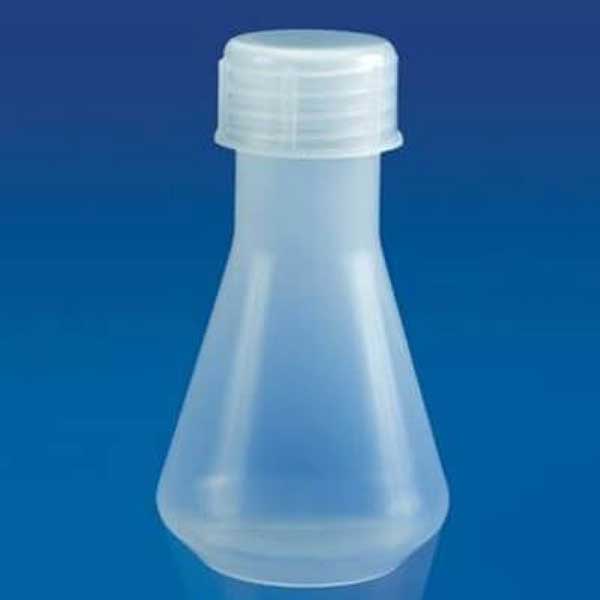Welcome to R.K. Laboratory & Scientific Instrument
Welcome to R.K. Laboratory & Scientific Instrument

PolyLab 250ml Plastic Conical Flask Made in India
High-Class Plasticware suitable for efficient day to day laboratory works and industrial use. A 250ml plastic conical flask is a laboratory container commonly used for various purposes in scientific and educational settings. Here are some features and potential uses of a plastic conical flask of this size: Capacity: The flask has a capacity of 250ml, indicating the maximum volume of liquid it can hold. Conical Shape: The conical shape of the flask allows for easy mixing and swirling of liquids. It is particularly useful in applications where substances need to be stirred or mixed without excessive splashing. Chemical Resistance: Plastic conical flasks are chosen for their chemical resistance to a wide range of substances. This makes them suitable for a variety of laboratory applications. The PolyLab Plastic Conical Flask with a capacity of 250ml is a laboratory tool designed for specific applications. Here are 14 key points related to the lab features of this particular flask: Material Composition: The flask is made of plastic, providing durability and chemical resistance. Common plastics used in laboratory equipment include polypropylene or polyethylene. Conical Shape: The flask has a conical shape, which is particularly useful for applications like titrations and mixing of liquids. The tapered design allows for easy pouring and facilitates swirling of contents. Volume Capacity: The flask has a specified volume capacity of 250ml, making it suitable for experiments that require precise volume measurements and mixing. Chemical Resistance: Plastic flasks are generally resistant to a variety of chemicals, ensuring that the flask remains stable and does not react with the substances being handled. Transparency: The flask is likely transparent or translucent, allowing for easy observation of the contents and reactions occurring within. This transparency is essential for monitoring reactions or titrations. Graduations: The flask may feature volume graduations marked on its surface, aiding in accurate measurement and dispensing of liquids. Lightweight: Plastic flasks are typically lightweight, making them easy to handle and suitable for applications where glass alternatives may be impractical or unsafe. Non-Breakable: Unlike glass flasks, plastic flasks are non-breakable, reducing the risk of accidents in the laboratory. This feature is especially valuable when working with students or in environments where breakage is a concern. Autoclavable: Some plastic flasks are designed to be autoclavable, allowing for sterilization and reuse in microbiological or cell culture applications. Sealing Cap: The flask may come with a sealing cap or lid to prevent evaporation or contamination of the contents during storage or transportation. Wide Base: The flask likely has a wide base for stability, minimizing the risk of tipping over during experiments. Versatility: Plastic conical flasks find applications in various laboratory settings, including chemistry, biology, and environmental science, showcasing their versatility. Economical: Plastic labware is often more cost-effective than glass alternatives, making it a practical choice for laboratories with budget considerations. Environmental Considerations: The use of plastic labware raises environmental considerations. Some plastics may be recyclable, and labs may have specific disposal protocols to follow. When using the PolyLab Plastic Conical Flask, it's important to follow proper laboratory practices, including cleaning and sterilization procedures as recommended by the manufacturer. Additionally, users should be aware of the specific chemical compatibility of the plastic with the substances being used in the flask.